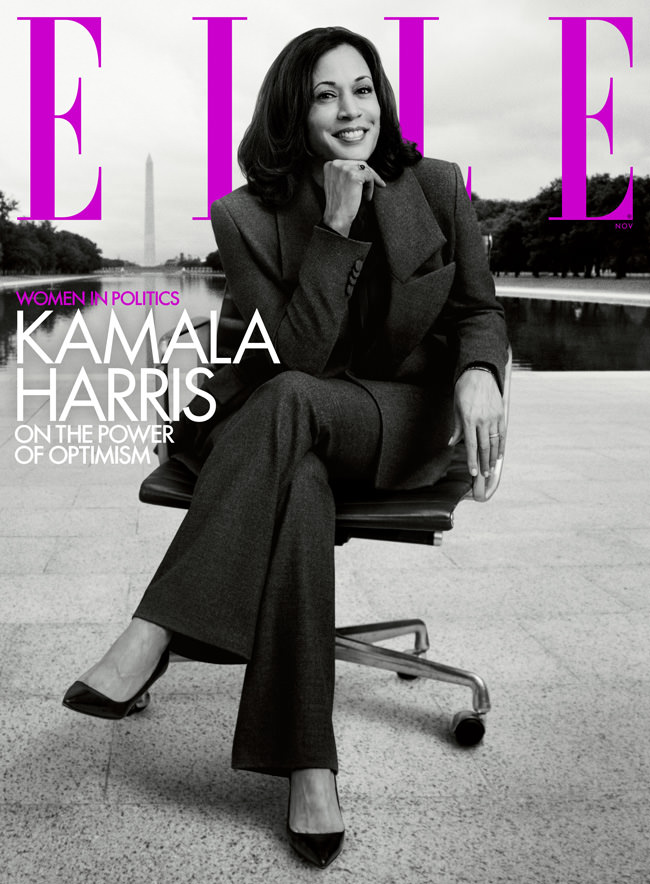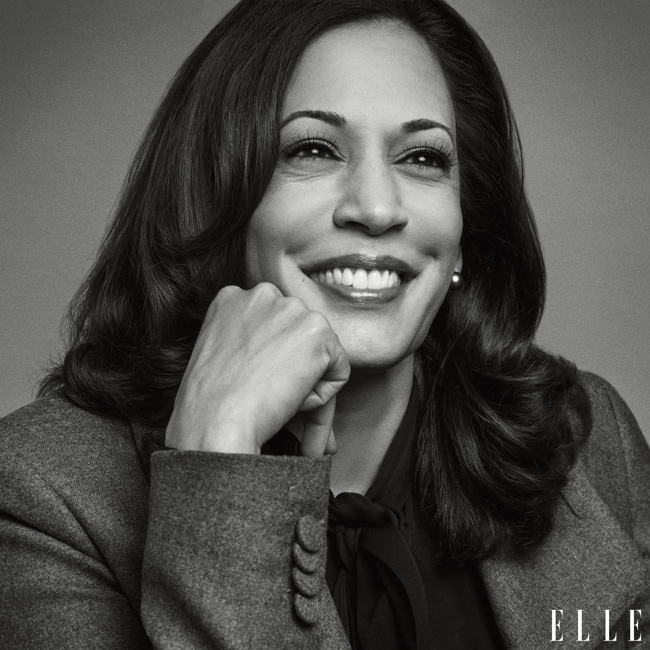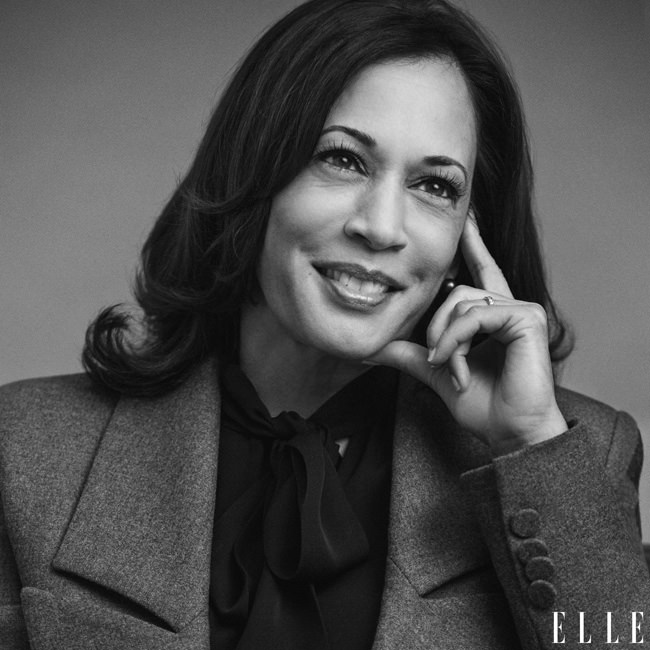Senator Kamala Harris covers ELLE’s November 2020 issue, on newsstands on November 3rd. The Democratic vice presidential nominee talks about the fight for justice and freedom she’s been waging since birth and why she wants Americans to feel hopeful. Photographed by Inez van Lamsweerde & Vinoodh Matadin and styled by Alex White. Written by Ashley C. Ford.



Senator Kamala Harris started her life’s work young. She laughs from her gut, the way you would with family, as she remembers being wheeled through an Oakland, California, civil rights march in a stroller with no straps with her parents and her uncle. At some point, she fell from the stroller (few safety regulations existed for children’s equipment back then), and the adults, caught up in the rapture of protest, just kept on marching. By the time they noticed little Kamala was gone and doubled back, she was understandably upset. “My mother tells the story about how I’m fussing,” Harris says, “and she’s like, ‘Baby, what do you want? What do you need?’ And I just looked at her and I said, ‘Fweedom.’”
As the senator and I log into our Zoom call, I have a lot of questions—and a few trust issues. I don’t sugarcoat my words: I start by asking what many of us would like to know. How can people who have only known the underside of this country’s boot trust her, another politician, to do the right thing? How will the people with the least visibility know that she sees them? Harris leans toward the screen and tells me about her favorite way to greet people, learned from various cultures in Africa. “When you [are introduced] for the first time, the greeting is not ‘Pleased to meet you.’ The greeting is ‘I see you.’ I see you as a complete human being. At this moment in time, it is so critically important in our country for all people to be seen in their full selves, in a way that gives them the dignity they deserve.”
On defending a person’s right to dignity from day one of her time in Washington: “I came to DC for orientation [in November 2016]. And then there was the inauguration, and the next day there was the Women’s March, where I spoke. And then I got on these committees. And then all these confirmation hearings for people like General [John F.] Kelly. Then right after that came the Muslim ban. Senator Harris was sitting in a DC apartment filled with unpacked moving boxes, fielding calls from civil rights lawyers she’d worked with over the years. They told her of clients detained by ICE officials and how they were unable to get information in or out: “‘Kamala, they’re not letting us talk to our clients.’” This would not do. “I’m used to being in the executive branch and getting things done,” Harris says of her time as attorney general of California. “And not having to ask permission. In fact, that’s why I’ve run for most offices I have run for, because I’m not so good sometimes at asking for permission.”
Somehow, she found the home telephone number of General Kelly, who at the time was secretary of Homeland Security, and called him up. “First thing he says to me: ‘How’d you get my number? Why are you calling me at home?’” The look she gives me—raised eyebrows and a slightly curled lip—indicate that his greeting, also, would not do. She says she told him she was calling “Because I’m a United States senator who represents one out of 11 Americans, and you right now have a situation that you need to explain to me about why your people aren’t letting them see their lawyers.”
On what justice means to a prosecutor who wants to defend our civil rights: “It’s about freedom, it’s about equality, it’s about dignity. When you achieve equality, and freedom, and fairness, it’s not because I grant it to you. It’s because you fought for it because it is your right. This is not about benevolence or charity; it is about every human being’s God-given right. What do we collectively do to fight for that? That’s what justice represents to me—it’s about empowerment of the people.”
On how it shaped her to grow up in an environment with such strong personalities and values: “There was no question that you had to dedicate yourself to fighting for justice on some level or another,” she says. “That the measure of you is so much bigger than you; it’s the impact you have, it’s what you do in service to others. And that’s how I was raised. I was raised that it is not about charity and benevolence, it’s about your duty. No one’s going to congratulate you for it—it’s what you’re supposed to do. If you sit at the dining table and you want to say something, you’d better be prepared to defend it, no matter how old or young you are.”
On not being ashamed of having evolved her perspective and hoping the current moment is the beginning of something, not the end: “What I hope and pray is that we can get to a point where, through what are undoubtedly difficult conversations, we confront the real history of America. Doing it in a way that is motivated by love, but also is fully honest.”
She believes if more white people understood how racism also hurts them, they would fight harder against racist systems and actions. And she has questions for white people who can’t seem to fathom how discrimination also disrupts their lives, especially those who struggle socioeconomically: “What did that whole characterization of poor Black women and calling them welfare queens do to public programs that were about feeding hungry children—all hungry children—regardless of their race?” she asks. I push back on this. There was a time when I would have agreed with her, but now? I’m skeptical. I’ve seen people at anti-mask protests, fighting for their right to die via COVID-19. I don’t know if those people care about suffering from the by-products of racism. I ask if she really believes that white people understanding how racism hurts them might change some of their minds. She looks sad for a moment, and says, “I do.” Then adds, “But it’s not the only way, right?”
On the night she became the second Black woman in history elected to the U.S. Senate and being ready to fight for freedom: “In every one of my elections, part of our routine is we do a small friends-and-family dinner before we go to the campaign night celebration.” She explains that it was looking like the election was going to be called for Donald Trump. “My godson, Alexander, who was seven years old at the time, came up to me, crying, and said, ‘Auntie Kamala, they’re not going to let that man win, are they?’ And you know the babies in your life.…” She closes her eyes and swallows. “I held him. I mean, it still brings me pain to remember how he felt, and what it made me feel, which is that I needed to protect this child. I had one way, in my mind, I thought the evening would go. And then there was the way it turned out. And so by the time I took the stage, I had ripped up my notes, and all I had was Alexander in my heart. And I took the podium and I said, ‘I intend to fight. I intend to fight.’ ”
[Photo Credit: Inez van Lamsweerde and Vinoodh Matadin for ELLE Magazine]
Marion Cotillard at the Chanel Fashion Show Next Post:
Cathy Cambridge Visits the University of Derby
Please review our Community Guidelines before posting a comment. Thank you!



